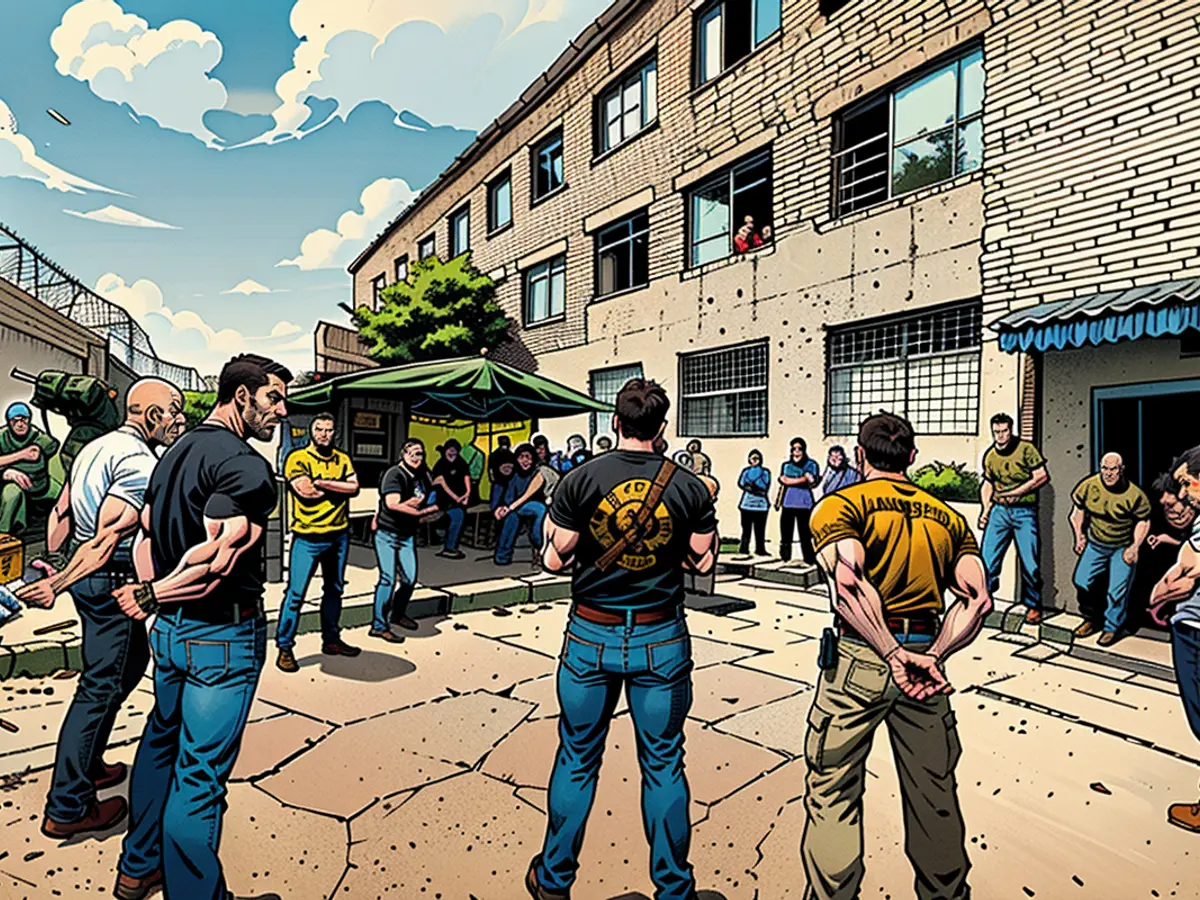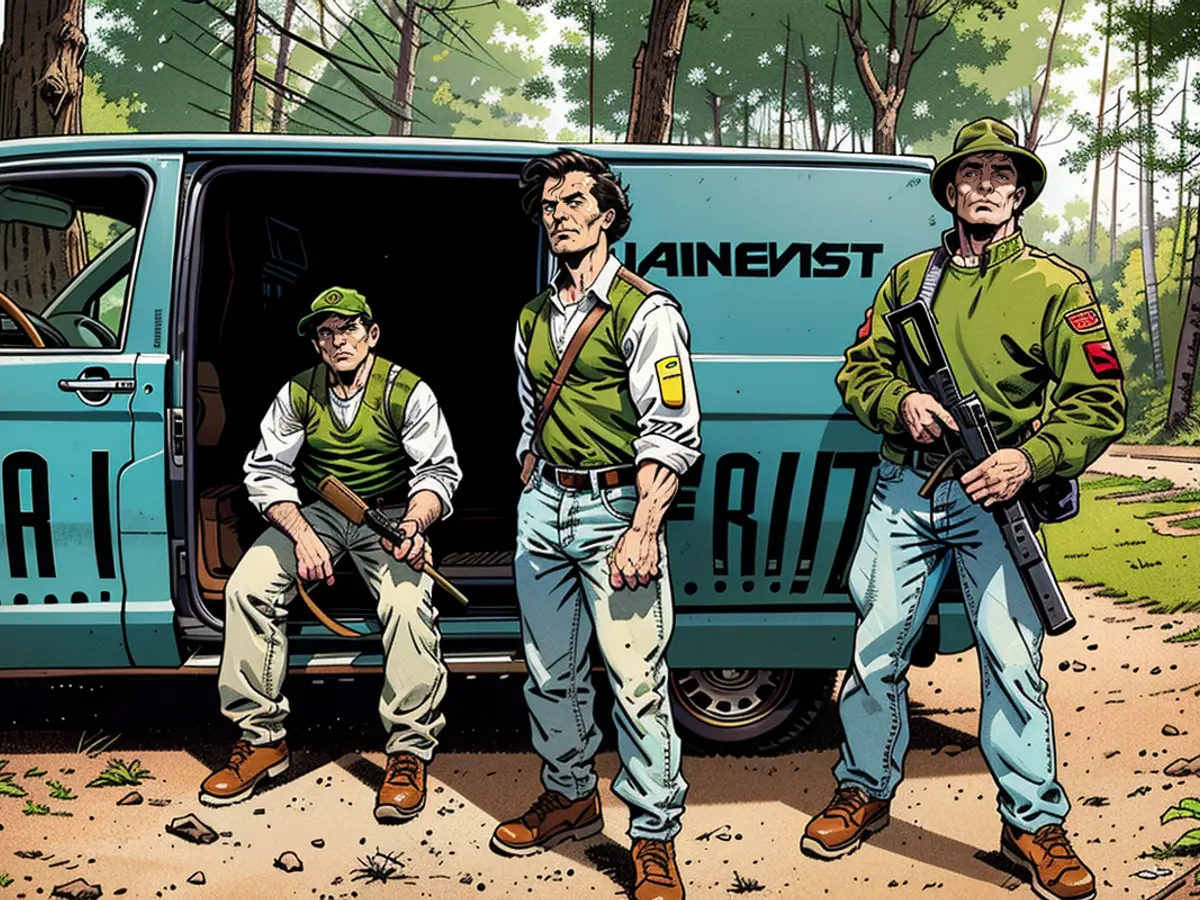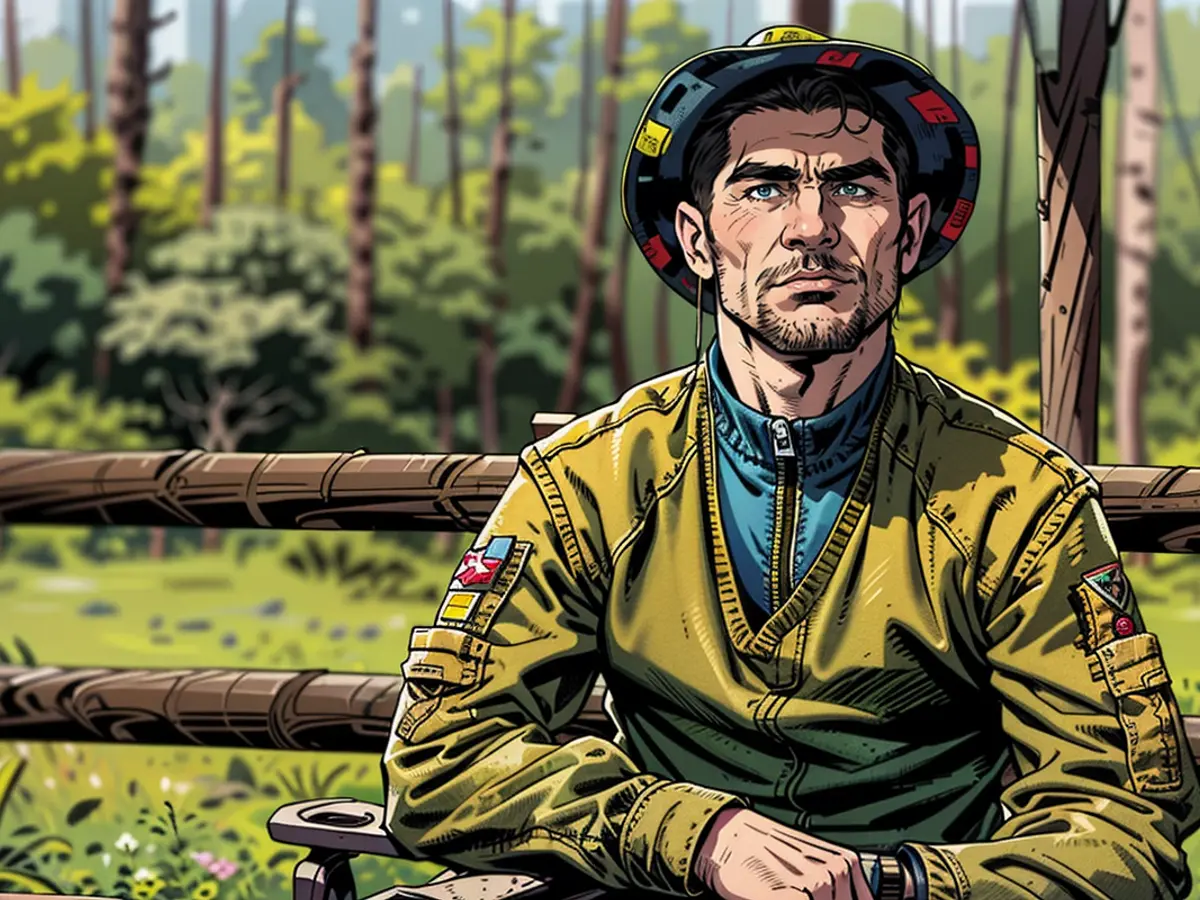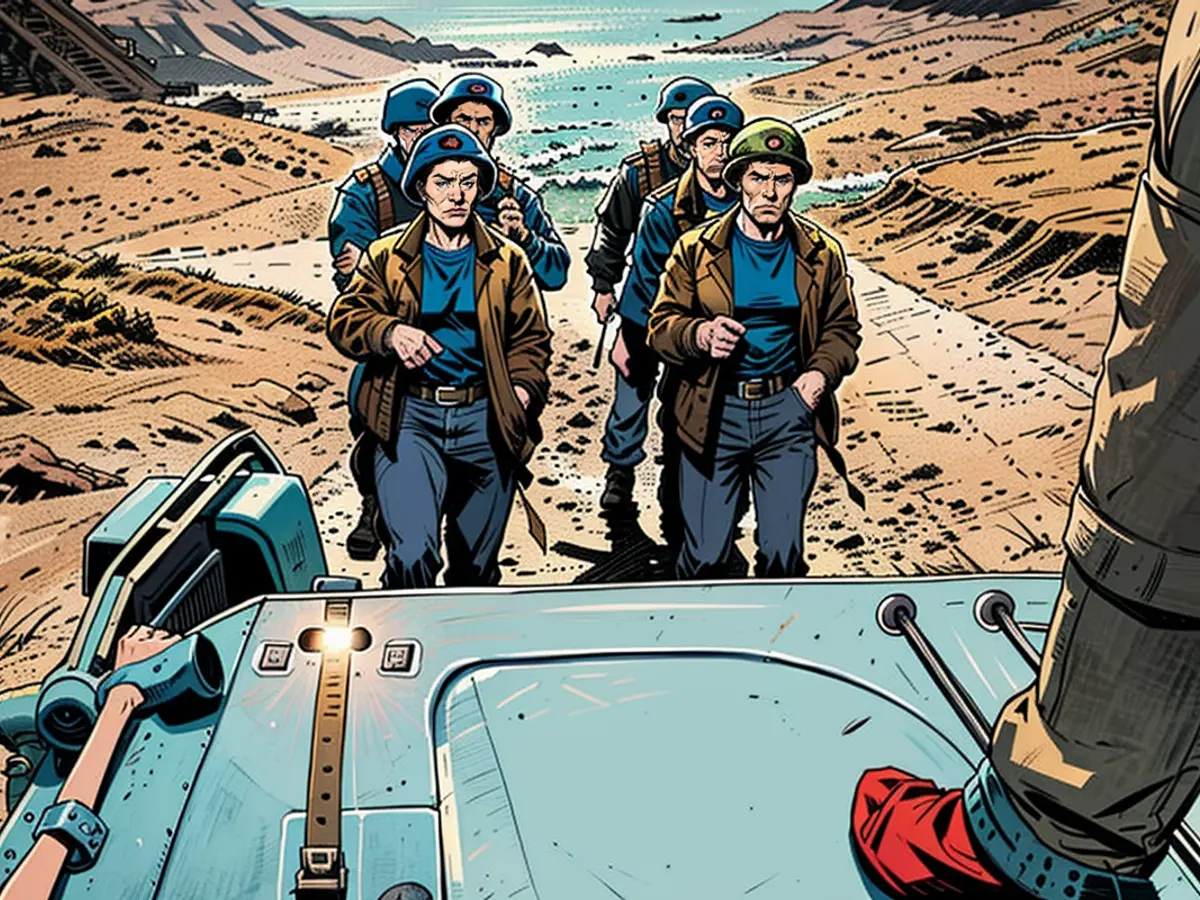Captives to Combatants: Uncovering Ukraine's Endeavor to Convert Convicts into Warriors
Kukharchuk, 34, is currently in a central Ukrainian prison trying to sign up physically fit, healthy, and motivated prisoners for his unit, the 3rd Separate Assault Brigade.
Nearly two and a half years into the Russian invasion of Ukraine, the country is struggling to refill its depleted military ranks. To tackle this, the government recently passed a law allowing convicts who meet certain criteria to be released conditionally if they enlist in the military.
Kukharchuk doesn't offer much incentive to the prisoners. "It won't be easy, but when you come to us, you're coming to a family," he tells the men, emphasizing that the brigade will not have any separate "penal" units. Instead, he says, these enlisted prisoners will be integrated into the existing battalions.
Some of the prisoners pay close attention, while others smirk. The situation changes, however, when Dato, one of Kukharchuk's colleagues, begins speaking. Dato, 58, has spent most of his life in prison. A convicted criminal, he has escaped three times and was paroled in February 2022 after serving 31 years. He joined the Ukrainian army mere hours after Russia invaded Ukraine on February 24, 2022.
Dato's voice carries across the yard, and when he pauses, there's an eerie silence. Approximately 700 inmates listen intently as he speaks, some out in the yard, others leaning out of their cell windows. Dato's speech is littered with slang from his time behind bars. He talks about honor, duty, and reputation. "This is your opportunity to redeem yourself in the eyes of your children," he tells them.
So far, several brigades have visited this prison to recruit over 100 inmates who have signed contracts with different units.
The new law prohibits the recruitment of individuals who have been convicted of crimes targeting Ukraine's national security or who have committed particularly severe corruption offences. Those with the most violent offences are also barred from joining. People found guilty of two or more premeditated murders, violent acts, or murders accompanied by rape or sexual violence are not eligible to sign up.
The actual application of the law has yet to be seen. Following its passage, Ukraine's Justice Ministry stated that these enlisted inmates would serve in separate units. However, Kukharchuk and Dato, representing the 3rd Separate Assault Brigade, express a preference for having the prison recruits fight alongside regular infantry.
Kukharchuk assured CNN that soldiers from his brigade have no issue with fighting alongside convicts. "How can you have a different attitude towards people who come to us, who will sit in the same trench with us, who will participate in assault operations with us and have our back?"
Yet, other commanders, while in favor of recruiting prisoners, are not entirely convinced about integration. "Prisoners should fight in separate units. And they need someone really good to lead them," Teren, a commander fighting in Avdiivka and calling for anonymity, said. The artillery reconnaissance commander with the 110th Mechanized Brigade echoed his sentiment, stressing that "I'm not against prisoners fighting at all. I'm surprised we didn't implement this idea at the start of the war. There are always a lot of casualties among the infantry, and if the convicts want to (go to fight in infantry), it's a good decision."
The convict recruits will be able to enjoy the same family leave as other soldiers and earn the same salary, but they will not receive the annual leave typical of other troops, according to the law.

Ukraine's Ministry of Justice estimates that there are currently 26,000 inmates in the country's prisons. Since the law's implementation, thousands of male inmates have applied to join the military. Almost 2,000 have passed their medical examinations and have been released from prison into the military upon court orders. The first batch of recruits has already started basic training, according to Ukraine's Minister of Justice, Denys Maliuska.
Speaking to CNN in Kyiv, Maliuska expects more convicts to enlist. While there are risks, he believes many view this program as an opportunity to shed the "ex-prisoner" label that often follows those who have been released.
"There are certainly risks. But the morale and mood of those who are released from prison are far higher than that of those who were mobilized elsewhere," Maliuska explained.
One who is conscripted against their will perceives it as an unfortunate event and a decline in their living situation. This category of soldiers may be more likely to go AWOL compared to those who see it as a social improvement, financial gain, beneficial lifestyle change, and admiration. Former prisoners see this as a positive change in their social status.
The Minister spoke with CNN regarding the potential issues commanders could face with prisoners. He said the law may be modified as required, depending on the circumstances that arise. The focus will be on the unit commanders' ability to cultivate discipline among the prisoners.
The strategy of recruiting inmates into the military seems similar to Russia's private military company Wagner's recruitment campaign in the early stages of the war and later taken over by the Ministry of Defense. A significant number of Russian convicts have made the ultimate sacrifice in the supposed "meat grinder" assaults, particularly in the fight for the eastern Ukrainian city of Bakhmut.
However, Maliuska dismissed the notion of a correlation.
"In Ukraine, the motivation is mainly driven by patriotism. Our prisoners voluntarily join the military. In Russia, it was both voluntary and forced. I have witnessed Russian prisoners being coerced into joining Wagner," he explained. He added that in Ukraine, ex-convicts are joining the Armed Forces of Ukraine, while in Russia, they were recruited into the notorious private military company Wagner.
"This is a conventional state military service with all the guarantees: salary, social insurance, compensation for injury, death, and more. This situation is entirely different in terms of the reasons and methods."
At a central Ukrainian training ground, a group of prisoners has already completed two weeks of basic training. One of them is 28-year-old Dmytro, whose wife and two small children were killed by a Russian attack on Izium shortly after the full-scale invasion of Ukraine, while he was serving a 4-and-a-half-year sentence in jail. He preferred to remain anonymous for safety reasons.

Dmytro shared with CNN why he wanted to fight as soon as the war began. He was among the first to sign up when the recruiters visited his prison.
"I had a family, and I couldn't protect them, so I will now protect other families who want to remain. I used to steal since I was young, but in prison, I learned how to thrive in a difficult environment. Orphans, who have a difficult past, are typically ones that do well in the military," he told CNN.
Dmytro said that upon hearing about the death of his family, he desired vengeance. He can't speak about his loss now, but dreams of the future when he can start anew and possibly give birth to kids who would be proud of him.
"I may only have a year and five months left on my term. I could simply serve the rest of my time in prison. However, I am motivated. I don't want other people to experience this," he said while referring to the death of his family.
At the prison where the inmates were chosen, Kukharchuk and Dato carefully select their applicants. During their interviews, they inquire into each volunteer's background and their reason for joining. The squad does not accept those who are older than 50, have severe health issues, or cannot physically handle it. orphans, though, are instantly prioritized.
Kukharchuk shared with CNN why orphans who have faced hardships in their upbringing and are proficient at adapting to challenging circumstances are successful in the military. After each consultation, the prisoners shake hands with the recruiters. The selected inmates fill out paperwork and wait for further directions.
Out of the 17 convicts who expressed an interest in joining on the day CNN visited the prison, the 3rd Separate Assault Brigade took 12. Kukharchuk stated that "This is an excellent number". The battle-hardened shareholders are frequently turned down by more than half of the convicts trying to join them.
Dato made an exception for one of the prisoners who had poor eyesight. Kukharchuk and Dato were initially hesitant to recruit him, but after a brief conversation, he was admitted.
"Eyesight can be improved. Motivation is more crucial than eyesight," says Dato.

Read also:
Europe is closely watching Ukraine's unique military recruitment program, as the country attempts to fill its depleted ranks by releasing certain convicts who enlist in the military.
In light of the ongoing global conflict, the world is paying attention to Ukraine's innovative approach to bolster its forces, utilizing its prison population to strengthen its defense efforts.







